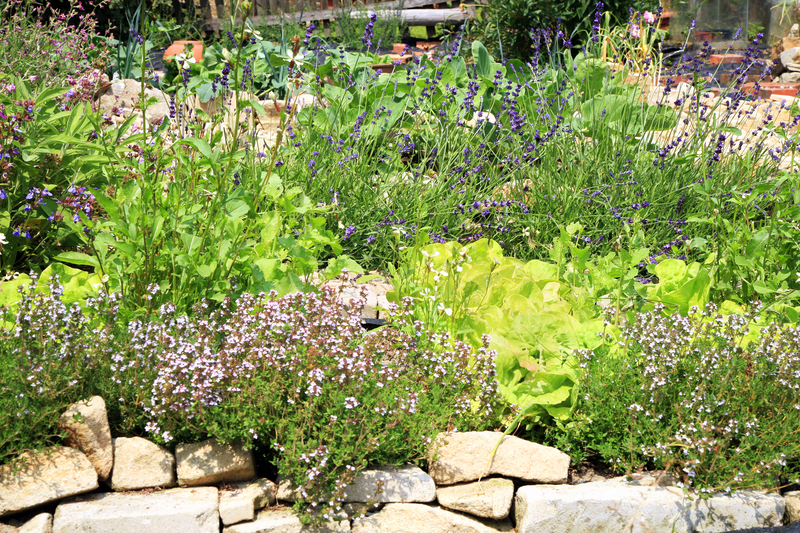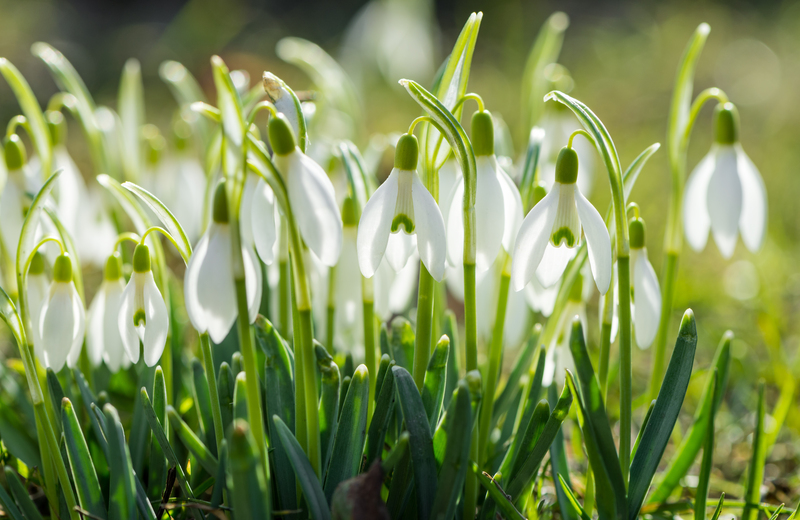Begin Your Green Journey: 9 Essential Gardening Tips for Beginners
Posted on 01/10/2025
Begin Your Green Journey: 9 Essential Gardening Tips for Beginners
Are you ready to embrace the beauty of nature and start your green journey? Gardening for beginners may seem overwhelming at first, but with the right advice and practical tools, your backyard, balcony, or even windowsill can quickly become a thriving oasis. In this comprehensive guide, we'll walk you through 9 essential gardening tips for beginners to ensure you plant, nurture, and grow your dream garden with confidence.
Why Gardening? Unleash the Joy of Growing
Gardening is far more than a hobby - it's a journey towards sustainable living, mental relaxation, and even better physical health. Whether you're aiming to grow food, beautify your home, or create a relaxing space, beginning a garden is an adventure that rewards patience and creativity. If you've ever wondered how to start, these basic gardening tips will set up your green paradise, one step at a time.

1. Start Small and Grow With Confidence
One of the top tips for beginner gardeners is to resist the urge to do too much at once. Start with a manageable space - even a few pots or a small raised bed will do. This allows you to get comfortable with plant care and observe how your garden grows through the seasons.
- Container gardens: Ideal for apartments and small spaces
- Herb windowsills: Great for fresh, easy-to-maintain flavors
- Patch or bed: Choose a corner of your yard for a beginner flower or veggie patch
With a modest beginning, your gardening journey can expand naturally as your confidence grows.
2. Understand Your Space: Sunlight and Climate Matter
Location is everything in gardening. Observe your prospective garden spot throughout the day:
- How many hours of sunlight does it get?
- Is it exposed to heavy wind or protected?
- What's the climate zone in your region?
Choose plants that match your environment for best results. Leafy greens may prefer partial shade, while tomatoes and peppers need full sun. If in doubt, consult helpful gardening zone maps or buy plants with region-specific labels to ensure healthy growth.
3. Get to Know Your Soil - The Foundation of All Gardens
Healthy soil is the secret behind any lush garden. For beginner gardeners, knowing your soil type--clay, sandy, loamy, or silty--is crucial.
- Test your soil: Basic test kits from nurseries will reveal pH and texture
- Improve your soil: Mix in compost or well-rotted organic matter to enrich poor soils
- Drainage is key: Well-draining soil prevents root rot--if in doubt, choose raised beds or containers
Remember, healthy plants begin with healthy soil!
4. Select Easy-to-Grow Plants First
Not all plants are suited for a beginner's touch. To set yourself up for success, opt for easy-care plants that thrive with little fuss:
- Herbs: Basil, mint, chives, and parsley adapt well to containers or windowsills
- Leafy greens: Spinach, lettuce, and kale are fast-growing and forgiving
- Marigolds and sunflowers: Hardy flowers that make your space pop with color
- Radishes and beans: Quick growing and satisfying harvests for beginners
Gradually, as your skills improve, experiment with more challenging varieties. The key is to avoid frustration and celebrate every little success!
5. Master the Art of Watering
Watering is essential--but often misunderstood. Here are key tips for a thriving garden:
- Don't overwater: Too much can drown roots and promote disease
- Check soil moisture: Insert your finger an inch deep - water if it feels dry
- Water early or late: This minimizes evaporation and keeps plants hydrated through heat
- Deep, infrequent watering: Encourages strong root development compared to frequent, shallow watering
Use a watering schedule, but always adjust for rain and the specific needs of your chosen plants. Remember, each plant is unique.
6. Feed Your Plants - The Right Way
Plants, like humans, thrive when properly nourished. Fertilizers replace nutrients lost from your soil--especially in pots or raised beds.
For beginner gardeners, organic options like homemade compost, worm castings, or store-bought granular fertilizers are perfect. Always follow application instructions and avoid overfeeding, which can burn plants. Nutrient-dense soil and regular organic feeding produce the healthiest, most productive plants.
7. Keep an Eye on Pests and Diseases
Unwanted bugs and plant diseases can sneak up on new gardeners. Learn to recognize common symptoms, such as bitten leaves or yellowing, and act early:
- Inspect regularly: Turn over leaves and look under stems every few days
- Use natural defenses: Encourage ladybugs, mantises, and wasps, or apply neem oil and homemade sprays
- Remove infected plant parts: Prune away sick leaves or stems quickly
Healthy, diverse gardens naturally resist many pests, so avoid using harsh chemical pesticides unless absolutely needed.
8. Practice Patience and Learn from Every Season
Gardening is a journey, not a race. Patience and observation are your greatest assets. Still, mistakes are part of every green journey. If something doesn't work, adjust your approach and try again next season.
- Keep a garden journal: Record what grows well and what doesn't for improved results year after year
- Celebrate your blooms and harvests: Even small successes deserve recognition!
- Seek inspiration: Join local garden groups or follow online gardening forums for fresh ideas and troubleshooting tips
With every passing season, your confidence and skills will bloom right alongside your plants.
9. Commit to Eco-Friendly and Sustainable Practices
Starting your green journey is also a pledge to protect our planet. Eco-conscious gardening preserves natural resources, benefits wildlife, and ensures a safe, healthy space for you and your family.
- Use organic mulches: Bark, straw, or clover reduce weeds, conserve water, and enrich the soil
- Collect rainwater: Simple barrels provide free, sustainable irrigation
- Minimize plastic: Opt for biodegradable pots or reuse containers whenever possible
- Compost food and garden scraps: Reduce landfill waste and create nutrient-rich soil amendments
Every small step counts--and together, beginner gardeners are transforming the earth, garden by garden!
Bonus: Tools Every Beginner Gardener Should Have
Getting the right tools can simplify the process for every new gardener. These essentials are a great place to start:
- Trowel & hand fork: For transplanting and soil loosening
- Watering can or hose: Choose a gentle spray for delicate seedlings
- Pruners: Keep plants tidy and encourage healthier growth
- Gardening gloves: Protect your hands from thorns and soil
- Sun hat & knee pad: Working comfortably lets you enjoy longer sessions outdoors

Common Mistakes New Gardeners Make (And How to Avoid Them)
- Planting too densely: Give each plant enough room for air circulation and growth
- Ignoring labels: Plant spacing, sunlight, and water instructions matter!
- Neglecting to weed: Weeds compete for nutrients and crowd out your chosen plants
- Forgetting to check for pests: Early intervention often saves your plants
- Over-fertilizing: Less is often more. Always follow guide recommendations for your specific plants
By avoiding these pitfalls, your beginner gardening experience will be even more rewarding.
Embrace Your Gardening Adventure
Starting a garden, no matter how small, is a victory over stress, pollution, and uncertainty. With these 9 essential gardening tips for beginners, you're not just learning how to grow plants--you're cultivating patience, mindfulness, and a deeper bond with nature.
Remember: Every master gardener was once a beginner! So plant your first seeds and watch your green journey flourish, season after season.
For more gardening inspiration and tailored advice on plant care, eco-gardening, and creative landscaping, keep exploring our website. Share your progress, connect with fellow growers, and let your green journey begin today!
Frequently Asked Questions from New Gardeners
- How often should I water my garden?
Generally, most plants need about an inch of water per week. However, always adjust for plant type, weather, and soil conditions. - What are the easiest vegetables to grow for beginners?
Try lettuce, radishes, beans, and peas--they germinate quickly and need minimal care. - How do I prevent bugs and diseases naturally?
Encourage beneficial insects, practice crop rotation, use organic sprays, and clear away diseased leaves promptly. - Do I need to fertilize my plants?
Most garden soils benefit from added organic matter or compost at planting time. For container plants, feed every 2-4 weeks during the growing season. - How can I tell if my plant is getting enough sunlight?
If it's growing slowly, looking pale, or stretching towards the light, it may need a sunnier spot.
Begin Your Green Journey Today
Thanks for reading our comprehensive beginner gardening guide! We hope these practical, eco-friendly tips empower you to kickstart your green journey with confidence. Remember, the best garden is the one you start today.
Happy gardening!
Latest Posts
Begin Your Green Journey: 9 Essential Gardening Tips for Beginners
Designing an Engaging Space for Little Explorers
The Ultimate Guide to Growing Your Own Herb Garden

